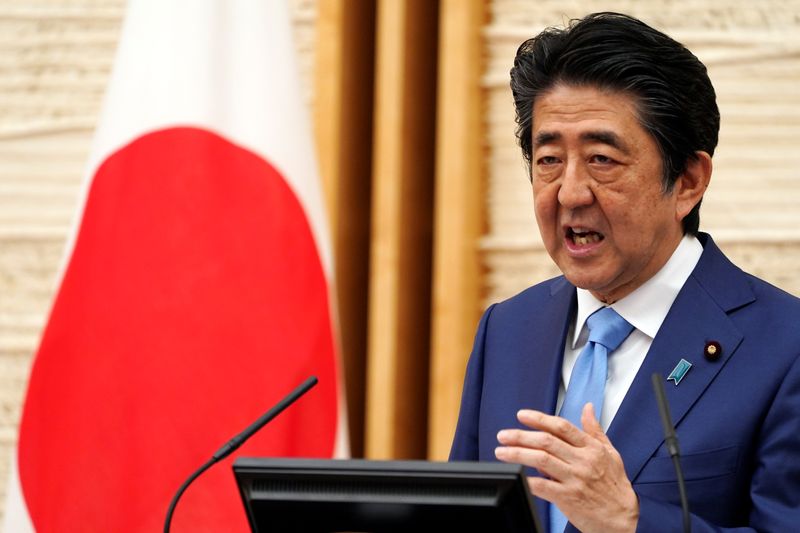TOKYO (Reuters) - Japan's Prime Minister Shinzo Abe on Monday extended a nationwide state of emergency to May 31, saying the new coronavirus infection rate had yet to drop enough to justify ending measures aimed at slowing the outbreak.
In a nod to the risk those restrictions pose to the world's third-largest economy, however, Abe promised to end restrictions earlier if experts advised him he could do so at a coronavirus task force due to meet on May 14.
He also said that the lockdown could be eased slightly in places with few infections and that libraries and museums across the country could reopen to limited numbers of visitors.
"May will be a month where we need to end this pandemic. It will also be a month where we will prepare for the next stage," Abe said at a press conference.
Sitting next to Abe, his leading expert and adviser Shigeru Omi noted that infection rates were falling even as testing was expanded, but he admitted that Japan was still only testing at around half of its daily capacity of 15,000. He urged people to socially distance, wear masks, and wash their hands.
Even though Japan has not seen a huge outbreak compared with some global hotspots, there are 15,965 recorded cases, including 712 from the cruise ship previously quarantined in Yokohama, and 568 deaths, according to public broadcaster NHK.
Abe urged the public to prepare for a long battle against the virus and asked them to continue practicing social distancing. People would need to adopt a "new lifestyle" for the coronavirus era, he said.
The government is spending $1.1 trillion, equivalent to a fifth of GDP, on stimulus measures to help companies and people hurt by the pandemic and lockdown measures.
On Monday, Abe promised additional steps to ease the economic impact of the lockdown, including money to cover rent payments, an expansion of aid to protect jobs and help for part-time workers who have lost their jobs.
"We will take action and act quickly to assist businesses and households," Abe said.
Unlike other governments that have forced businesses to close and ordered people to stay home, Abe's administration is only able to request compliance with coronavirus measures, meaning some bars and restaurants in heavily infected cities such as Tokyo and elsewhere remain open.
In 13 prefectures including Tokyo and Osaka that have been hardest hit, the government is aiming to reduce the number of people in busy shopping and entertainment districts by 80%.
Abe on Monday apologised for failing to achieve that goal in most places and said the reduction target will remain, in a bid to push new infections below 100 a day, or fewer than the number of recovered people leaving hospital.
In sign that the lockdown measures were working, his advisers, however, said that those infected were already on average passing the virus on to less than one person.
But Kenji Shibuya, director of the Institute of Population Health at King’s College London, said the experts were "sending a conflicting message".

They say that the contact rate between people is not down enough but that the reproduction rate is below one, "so it is difficult to tell on which basis they did reach the conclusion to extend the declaration," Shibuya said.